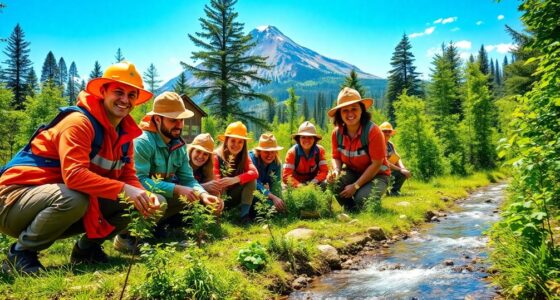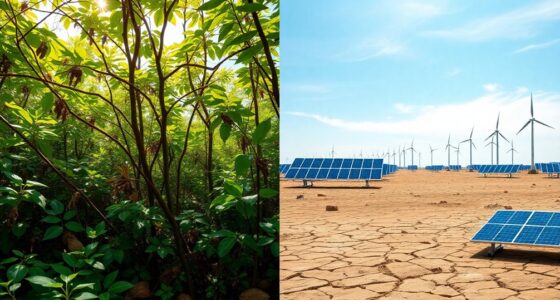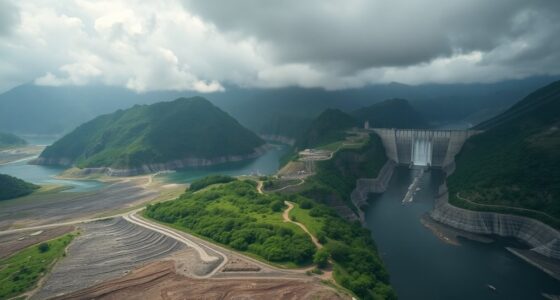Conservation in the Amazon faces major challenges like deforestation, illegal mining, and climate change, putting its rich biodiversity at risk. Indigenous communities play a key role in protecting the forests through sustainable land management and traditional knowledge. Sustainable tourism and responsible actions can support these efforts while helping local people thrive. If you want to discover how community initiatives make a difference and what you can do to help, there’s more to explore.
Key Takeaways
- Indigenous communities play a crucial role in sustainable land management and ecosystem preservation.
- Deforestation, illegal mining, and climate change pose urgent threats to Amazon biodiversity.
- Eco-tourism promotes responsible travel, supporting local economies and conservation efforts.
- Balancing development needs with conservation requires community-led initiatives and responsible practices.
- Collective action and respect for indigenous rights are vital for protecting the Amazon’s future.

Why is conservation in the Amazon more urgent than ever? The rainforest faces unprecedented threats from deforestation, illegal mining, and climate change, putting countless species and indigenous communities at risk. You might wonder how you can make a difference, but understanding the essential role of local communities and responsible practices is key. Indigenous stewardship, for example, plays a critical part in safeguarding the Amazon’s delicate ecosystems. Indigenous peoples have stewarded these lands for centuries, utilizing sustainable methods that preserve biodiversity while meeting their needs. Their deep knowledge of the forest’s rhythms and resources allows them to manage the land without exploiting it. Supporting indigenous-led conservation initiatives empowers these communities to maintain their traditional ways while protecting their environment from external pressures.
Indigenous stewardship is vital for safeguarding the Amazon’s fragile ecosystems and preserving biodiversity.
Sustainable tourism also offers a promising avenue for conservation efforts. Instead of destructive logging or land clearing, eco-tourism encourages visitors to experience the Amazon’s beauty responsibly. When you choose sustainable tourism options, you contribute directly to local economies that prioritize conservation and community well-being. These initiatives often involve local guides and artisans, ensuring that profits stay within the community and that environmental impacts are minimized. By participating in eco-tours, you help raise awareness about the importance of preserving the rainforest and its rich cultural diversity. It’s a win-win situation: tourists enjoy an authentic experience, and communities gain the resources needed to keep their environments healthy and vibrant.
The challenge lies in balancing economic development with conservation. Many communities face poverty and lack alternatives to activities that harm the forest, making them vulnerable to illegal activities like logging or mining. Here, your support and advocacy can make a difference. By choosing to travel responsibly, donating to conservation projects, or spreading awareness about the importance of indigenous stewardship and sustainable tourism, you help create a momentum for change. These efforts foster a sense of shared responsibility—recognizing that protecting the Amazon isn’t just about saving trees, but about defending the culture, biodiversity, and climate stability that depend on these forests.
In the end, the future of the Amazon depends on collective action. You have a role to play in supporting community-led conservation practices, respecting indigenous rights, and promoting sustainable tourism. When you do so, you’re helping to ensure that this crucial ecosystem continues to thrive for generations to come. It’s about recognizing the power of communities and responsible choices in making a real, lasting difference.
Frequently Asked Questions
How Do Local Communities Benefit Financially From Conservation Efforts?
You can benefit financially from conservation efforts through eco-tourism benefits, which attract visitors enthusiastic to experience the Amazon’s beauty. This promotes sustainable livelihoods by creating jobs and supporting local businesses. When communities participate in conservation, they often receive funding or grants, and sell eco-friendly products. These opportunities provide a steady income stream, empowering you to preserve your environment while improving your quality of life.
What Specific Species Are Most at Risk in the Amazon?
Think of the Amazon as a delicate tapestry unraveling. You see, species like the jaguar, giant river otter, and Amazonian manatee are most at risk due to habitat destruction and species extinction. These animals struggle to survive as their homes vanish, making them vulnerable to disappearing forever. Protecting their habitats is essential to stop this loss, ensuring the lush web of life in the Amazon remains vibrant for generations to come.
How Is Climate Change Impacting Amazon Biodiversity?
Climate change worsens Amazon biodiversity by causing deforestation impacts, which destroy habitats and force species to adapt or perish. Rising temperatures also allow invasive species to thrive, outcompeting native ones and disrupting ecosystems. You might notice shifts in animal populations or the disappearance of certain plants. These changes threaten the delicate balance of life in the Amazon, making it harder for many species to survive and maintain their natural roles.
What Role Do Indigenous Knowledge and Practices Play?
Imagine the Amazon’s heartbeat—its vibrant ecosystems—guided by indigenous stewardship. Your role in understanding that traditional practices are like living libraries, holding centuries of wisdom, is essential. Indigenous communities harness their knowledge to sustainably manage resources, protect biodiversity, and fight deforestation. By supporting these practices, you help preserve the rainforest’s delicate balance, ensuring that age-old traditions continue to serve as a critical shield for the Amazon’s future.
How Can Tourists Contribute Positively to Conservation?
You can contribute positively to conservation by supporting eco-tourism benefits, which promote sustainable travel that benefits local communities and ecosystems. When you participate in responsible tourism, you help raise awareness and generate funds for conservation projects. Additionally, seek volunteer opportunities that directly assist local communities or environmental initiatives. Your mindful choices, like avoiding harmful activities and respecting local customs, make a tangible difference in preserving the Amazon’s unique biodiversity.
Conclusion
As you reflect on the Amazon’s fragile beauty, remember your role in its future. The challenges are formidable, but community efforts hold promise—if you stay committed. Will your actions today help protect this essential rainforest for generations to come? The outcome depends on each of us, and the clock is ticking. The story of the Amazon isn’t just theirs; it’s yours too. Are you ready to be part of the change before it’s too late?







